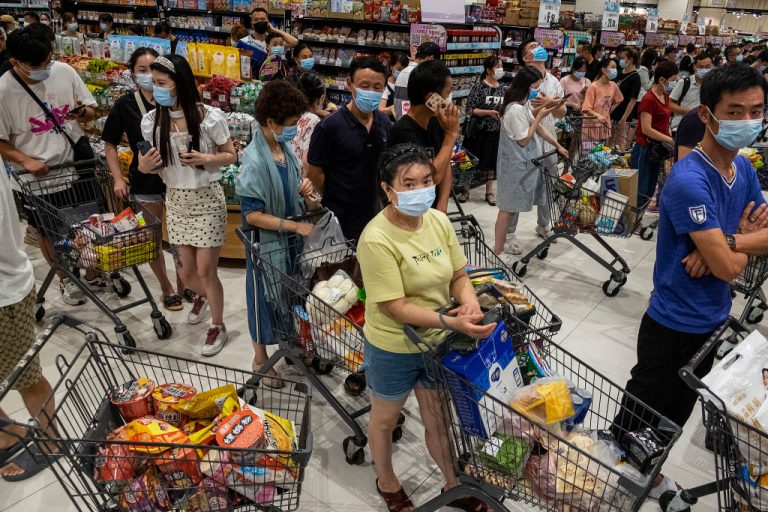Beijing has sent Chinese citizens into a frenzy after issuing a notice that asked people to stock up on essential supplies. Though the government did not provide a clear reason for the instruction, the fact that it came at a time when the country is struggling with a new wave of COVID-19 infections and numerous natural disasters which has affected the food supply it was enough for people to start thinking about the worst possible scenario.
As panic spread, supermarkets were swarmed. “As soon as this news came out, all the old people near me went crazy, panic buying in the supermarket,” one person wrote on Weibo. A user pointed out that the government had not informed them about stocking goods when the pandemic began last year. Another user speculated the notice was to indicate that people might not be able to afford vegetables when the winter season arrives.
State media later attempted to quell concerns that triggered the panic buying. CCP-backed media outlet, The Economic Daily, asked people to remain calm and not get alarmed. It insisted that the notice was only a piece of advice put forward by the government to ensure that houses are stocked with daily essentials in case a COVID-19 lockdown is announced in their region.
Hu Xijin, editor of state-backed Global Times, dismissed suggestions that the notice was in some way connected to the tensions between China and Taiwan. State broadcaster CCTV published an interview with Commerce Ministry official Zhu Xiaoliang who insisted that daily supplies are sufficient and “fully guaranteed.” He stated that the notice was aimed at local authorities.
Bad weather has affected China’s food production. In early October, extreme weather destroyed crops in the Shandong area, which is the largest vegetable growing region in China.
Success
You are now signed up for our newsletter
Success
Check your email to complete sign up
One farmer from the province told state-backed Global Times that the output of vegetables is too low this year. The unusually heavy rains had slashed tomato output by around 25 percent when compared to the previous year.
In Henan province, three months of rainfall has flooded much of the flat agricultural lands, submerging them under water. “There is nothing this year. It’s all gone… Farmers on the lowland basically have no harvest, nothing,” farmer Wang Yuetang told the Daily Mail.
According to data from the Ministry of Agriculture and Rural Affairs (MOA), vegetable prices rose by 16 percent in October.
The price of 26 vegetables rose from September, with spinach and cucumber surging by 45 percent and 80 percent respectively. In Shanghai, the prices of some vegetables were close to the price of meat.
According to Wang Hongcun, an official with the Beijing Municipal Commerce Bureau, the nationwide effort to contain COVID-19 cases might also be a contributing factor to surging food prices. The cost of transiting between regions could rise due to strict containment measures. This cost will likely get added to the final price of food items.
China’s strict zero-tolerance COVID-19 policy results in authorities shutting down a region immediately when infections are detected. The rush to bring the viral outbreak under control is also triggered by the Winter Olympics due to be held in the country in February 2022. Beijing expects to have zero daily COVID-19 infections by this time.
China’s commerce ministry has instructed local authorities to sign long-term contracts with agricultural suppliers so as to secure food for winter. The government is also asking people not to order more food than what is necessary and report on restaurants that waste food.














